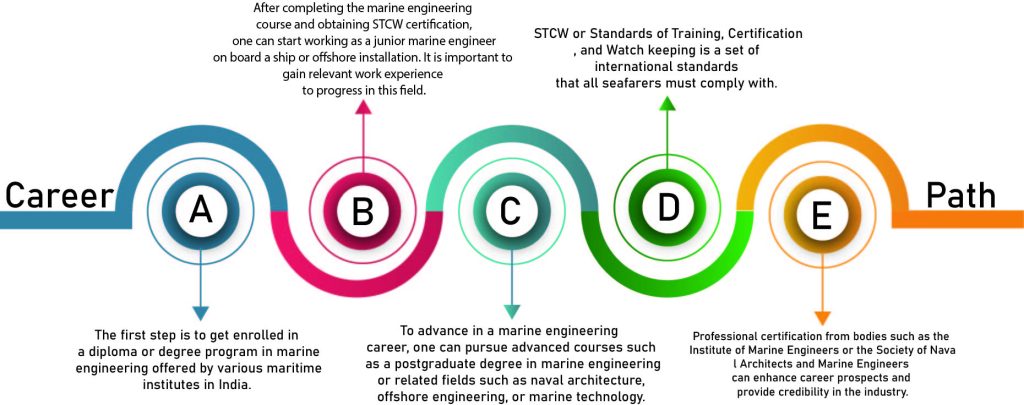Marine engineering is a branch of engineering that deals with the design, construction, and maintenance of watercraft and offshore structures such as ships, boats, submarines, oil rigs, and pipelines. Marine engineers are responsible for ensuring the safe and efficient operation of these vessels and structures, as well as developing new technologies to improve their performance and reduce their environmental impact. The field of marine engineering requires knowledge and skills in various disciplines, including mechanical, electrical, and naval architecture.

Work description
Marine engineers are responsible for designing, developing, and maintaining various types of marine equipment and systems used in ships, boats, offshore oil rigs, and other marine structures. They work to ensure the safe and efficient operation of these structures and the equipment they contain.
Their duties include designing and testing new marine equipment, overseeing the construction and installation of new systems, conducting regular maintenance and repair work, troubleshooting equipment problems, and ensuring compliance with safety and environmental regulations.
Marine engineers may also be involved in managing the crew and other personnel on board ships and other marine vessels, as well as overseeing the operation of the vessel itself.
They may work in a variety of industries, including shipping, oil and gas, and naval architecture, and often collaborate closely with other professionals such as naval architects, marine surveyors, and shipbuilders.
High Demand
High earning potential.
Lucrative salaries
Opportunity to travel the world and experience different cultures.
Opportunities for innovation
Job security and stability due to the demand for skilled marine engineers.
Versatility
Opportunity for career growth and advancement into leadership roles.
Flexibility
Chance to work on cutting-edge technology and innovative projects.
Job satisfaction
Ability to work in a challenging and dynamic environment.
High stress
Long periods of time away from family and friends.
Long hours
High levels of stress and responsibility, especially in emergency situations.
Competitive field
Exposure to harsh weather conditions and potentially hazardous environments.
Constant learning
Limited access to medical care and other amenities while at sea
Isolation
Demanding work schedule with irregular hours and shifts.
Eye strain and other physical health issues
Limited opportunities for work-life balance, especially for those working on offshore oil rigs or other remote locations.
The cost of pursuing a career in marine engineering in India can vary depending on various factors such as the type of institute, course duration, and living expenses. Here are some approximate estimates of the cost involved:
Diploma courses (if chosen) in marine engineering can cost anywhere between INR 1 to 2 lakhs.
Bachelor’s degree courses in marine engineering can cost anywhere between INR 5 to 10 lakhs.
Postgraduate courses in marine engineering can cost around INR 3 to 5 lakhs.
Additional costs such as accommodation, food, books, and travel can also add to the cost.
It is important to note that these estimates can vary significantly based on the specific institute and course chosen.
[wpcharts type=”horizontalbarchart” bgcolor=”red:gray:yellow,blue:gray:yellow,random:gray:yellow,purple:gray:yellow” min=”0″ legend=”true” titles=”2 year , 5 year” values=”3,7,5,12″]
The earning potential of a marine engineer in India can vary depending on several factors such as the employer, work experience, educational qualifications, and job location. However, entry-level marine engineers with a diploma or bachelor’s degree can expect to earn a starting salary of around INR 4 to 6 lakhs per annum.
Marine engineers with some experience and advanced qualifications such as a postgraduate degree can earn between INR 8 to 15 lakhs per annum.
Senior marine engineers with more than 10 years of experience can earn between INR 20 to 30 lakhs per annum or even more, depending on their level of expertise and responsibilities.
Marine engineers working in the private sector, especially in offshore oil and gas exploration, tend to earn higher salaries than those working in the government or public sector.
[wpcharts type=”horizontalbarchart” bgcolor=”red:gray:yellow,blue:gray:yellow,random:gray:yellow,purple:gray:yellow” min=”0″ legend=”false” titles=”Entry-Level, Mid-Career, Senior-Level ” values=”5,15,25,35,45,55″]
Strong background in Mathematics, Physics, and Chemistry.
Good problem-solving skills.
Attention to detail.
Ability to work in a team.
Good communication skills.
Adaptability and flexibility to work in changing environments.
Strong technical and mechanical aptitude.
Weakness in core subjects such as Mathematics, Physics, and Chemistry
Lack of attention to detail
Poor communication skills
Inability to work in a teama
Lack of physical fitness
Motion sickness or other health conditions that prevent working on ships
Lack of interest in marine technology and ships
Work-life balance
The work-life balance of a marine engineer can vary depending on the employer and work assignment. Generally, marine engineers work on a contractual basis for a specific duration, typically for 4-6 months, followed by an equal duration of time off. During the contract period, marine engineers work in a rotation schedule that involves long working hours, sometimes up to 12 hours per day, and often 7 days a week.
The work environment can be physically demanding, as marine engineers may be required to work in extreme weather conditions, and the work can be mentally challenging due to the need for constant vigilance and problem-solving. During their time off, marine engineers can relax and spend time with family and friends.
Overall, the work-life balance of a marine engineer can be challenging due to the nature of the job. However, with proper time management and a supportive employer, marine engineers can maintain a good work-life balance and enjoy a fulfilling career in this field.

Contributes to the global economy by supporting the shipping industry and offshore energy production.
Provides opportunities for travel and exploration of different parts of the world.
Offers a challenging and rewarding career with high earning potential.
Supports innovation and technological advancements in marine technology and engineering.
Provides employment opportunities for individuals with technical and engineering skills.
Can negatively impact mental health due to isolation and prolonged periods away from home.
Naval Architecture
Design and construction of ships, boats, and other marine vessels.
Marine Electrical Engineering
Design and installation of electrical and electronic systems on ships and offshore structures.
Marine Mechanical Engineering
Design and development of marine engines and propulsion systems.
Offshore Engineering
Design and construction of offshore structures such as oil rigs and wind turbines.
Marine Materials Engineering
Study and development of materials used in marine structures.
Conclusion:
In conclusion, marine engineering is a challenging and rewarding career path that offers a unique opportunity to work in an exciting and constantly evolving industry. With its high earning potential, opportunities for travel, and diverse career paths, marine engineering is an excellent option for individuals with a passion for engineering, technology, and the marine environment. However, it’s important to consider the potential drawbacks, such as long periods away from home and the physically demanding nature of the work. With the right qualifications, training, and mindset, individuals can pursue a successful and fulfilling career in marine engineering.



